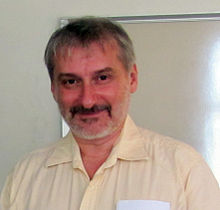Leonid Levin
| Leonid Anatolievich Levin | |
|---|---|
 |
|
| Born |
November 2, 1948 Dnipropetrovsk, Ukrainian SSR, Soviet Union |
| Fields | Computer Science |
| Institutions | Boston University |
| Alma mater |
Moscow University Massachusetts Institute of Technology |
| Doctoral advisor | Andrey Kolmogorov, Albert R. Meyer |
| Known for | research in complexity, randomness, information |
| Notable awards | Knuth Prize (2012) |
Leonid Anatolievich Levin (le-oh-NEED LE-vin; Russian: Леони́д Анато́льевич Ле́вин; Ukrainian: Леоні́д Анато́лійович Ле́він; born November 2, 1948) is a Soviet-American computer scientist.
He is known for his work in randomness in computing, algorithmic complexity and intractability, average-case complexity, foundations of mathematics and computer science, algorithmic probability, theory of computation, and information theory. He obtained his master's degree at Moscow University in 1970 where he studied under Andrey Kolmogorov and completed the Candidate Degree academic requirements in 1972.
He and Stephen Cook independently discovered the existence of NP-complete problems. This NP-completeness theorem, often called the Cook–Levin theorem, was a basis for one of the seven Millennium Prize Problems declared by the Clay Mathematics Institute with a $1,000,000 prize offered. The Cook–Levin theorem was a breakthrough in computer science and an important step in the development of the theory of computational complexity.
...
Wikipedia
